Colby R. Rice's Blog, page 16
February 17, 2017
Colby’s Creative Journal (2/17/17): THREE Giveaways and Getting Business Savvy as a Creative
After a brief hiatus, I’m back (FINALLY!!), and still committed to this badass creative journey I’m on. TONS of busy work happening this month as I’m desperately taming the psycho lion that is grad school and the personal challenges that come along with it. I’m nearly at the finish line of this semester’s mad dash, so bear with me. 
February 13, 2017
Play Review: “The River” by Jez Butterworth
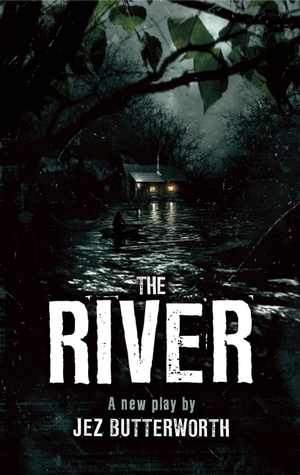 The River by Jez Butterworth
The River by Jez ButterworthMy rating: 5 of 5 stars
** spoiler alert ** I read this play for my Playwriting class, so read this review with that in mind.
*** READER BEWARE SPOILERS FROM HERE ON IN! ***
This is another piece that tricks you into thinking it meanders… and then it punches you right in the face as the playwright shows you exactly where this is going. A really lovely and poignant story of love, loss, and patterns of pain that are acknowledged, but somehow remain unbroken. I really appreciate that the playwright felt no need to wrap this up with a blow and slap it upside the cheek with a happy ending. The man’s journey and fate is very real: his search for love, his failures to find it, and his de-evolution into what his uncle used to be… or is this more of a “to be continued” / “he’s still looking for real love” kind of ending?
Not sure, but either way I enjoyed the ambiguity of it all. That in itself was my entry point / human portal into the piece among all the wonderful imagery and mythology. The ambiguousness of life and the weird journey it sends us all on.
What really struck me too were the craft and methods used here: the metaphors with the fish, the Nordic (?) mythology, the poetry and the singing (which I loved), and the emotional realness of the characters. At first blush, the characters feel like Mary Sues and a John Doe, more like avatars for the human experience rather than humans themselves. In some ways this works, and in others, it limits my connection to the characters. In how they represent our emotional and existential struggles, however, the playwright is spot on (imo).
The thing I loved the most about the playwright’s craft here, though, is that he plays around with time, continuity, and emotional temporality in an interesting way. Instead of creating a realistic timeline of events, he instead chooses a variety of focal points: the scarlet dress, the reflection in the bowl, the dive into the freezing water. All stark, striking, and tactile images that really activate, engage, and bewitch the senses. As far as plot goes, The River didn’t do it for me, but as for the other things that comprise a theatrical experience (especially on the emotional level), I was super engaged and touched by the end.
Rock on, READ on,
The post Play Review: “The River” by Jez Butterworth appeared first on .
February 7, 2017
Play Review: “Bethlehem” by Octavio Solis
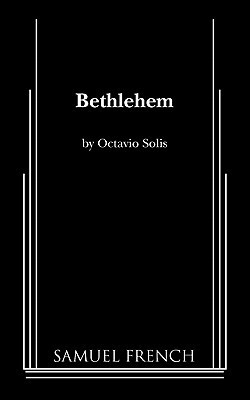 Bethlehem by Octavio Solis
Bethlehem by Octavio SolisMy rating: 5 of 5 stars
As an FYI, this is yet another play I read for my Playwriting class, so read this review with that in mind. Some very gutty gut reactions here, and there are spoilers. Ok, cool. Let’s get it on!
*** READER BEWARE SPOILERS FROM HERE ON IN! ***
Seriously. Reading this was triggering and traumatizing AF.
OOOOKAY, now that I’ve reacted, I’m going to attempt to discuss Bethlehem from a dramaturgical perspective, lol. This play was masterfully done, and the playwright’s command of unreliable narrative was mindblowing to say the least. I really loved the amorphous, transcendent nature of characters in the play, and Solis makes sure to build a world built around the language and context of the field of surgery– organs, autopsy language, etc. There are a lot of craft-centered things done here that work so well.
As for the story, I was sick to my stomach. In the end, I honestly have no idea what happened to who in the play, not because it wasn’t clear necessarily, but because I just simply did not want to know who raped who’s sister, got raped by his father, butchered yet another innocent woman, strangled his girlfriend, raped a corpse, and then murdered yet another person, cut his heart out, and put it in a bag.
Wtf.
Am I the only one who was just so completely overwhelmed by the content that wading through the craft and analysis of it feels like a monumental task? Anyone? Bueller? (Did I spell that right?) Anyways… those are my thoughts. I’m so glad I don’t have wine on deck, because I’d totally just climb into the bottom of the bottle and just never come out. That’s how this play made me feel.
Rock on, READ on,
The post Play Review: “Bethlehem” by Octavio Solis appeared first on .
February 6, 2017
Colby’s Creative Journal (2/6/17): Updates, Giveaways, and Applying for Art Fellowships
Got LOTS of Giveaways going on this month! Join the list here to get the giveaways delivered RIGHT to your inbox: https://app.convertkit.com/landing_pa...
Today I’ve got some shorter than usual updates on my creative progress. I also discuss places to get educated as a filmmaker and the importance of consistently applying for scholarships and funding as a working artist.
VIDEO ROADMAP:
01:30 Grad School Update
02:09 Building Rebel Ragdoll’s Infrastructure & Brand
03:20 Staying Educated as a Creative
03:55 The Hybrid Creative: Indie Entrepreneurship vs. Working at a Traditional Media Outlet
06:42 Screenwriting, Sandman, Novel Writing, and Novel Series
07:13 Great Plays to Read
08:56 Dramaturging CREEPS + Mashing Together Theatre & Film
09:45 I’m Making a Documentary about Black Women in Horror!!!
11:30 Self-Care, Rest, and Watching A LOT of Films
12:51 FOUR February Giveaways! Click Link Below to Get Info!
16:33 Composing Music for Films, Creating Film Trailer Music, and Learning the Business of Music Licensing!
18:30 Other Movies to Check Out (The Taking of Deborah Logan, Belle, The Raid)
20:35 Added a New Film Idea to My Project Slate
21:57 Learn Directing, Visual Effects, and Blocking / Staging with Hollywood Camera Work
22:45 Applying for Fellowships, Scholarships, and Funding as a Working Artist!
VIDEO RESOURCES:
1. Join my giveaway list to get LOADS of free books: https://app.convertkit.com/landing_pa...
2. Check out Hollywood Camera Work to Learn Directing, Visual Effects, and Blocking / Staging: http://hollywoodcamerawork.com
The post Colby’s Creative Journal (2/6/17): Updates, Giveaways, and Applying for Art Fellowships appeared first on .
January 31, 2017
Play Review: “The Long Christmas Ride Home” by Paula Vogel
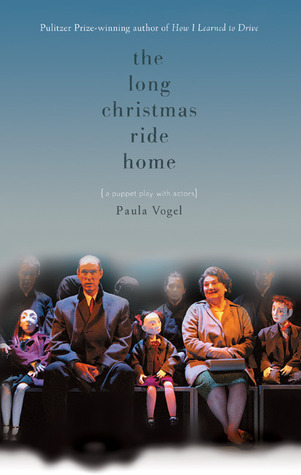 The Long Christmas Ride Home by Paula Vogel
The Long Christmas Ride Home by Paula VogelMy rating: 5 of 5 stars
Man, Vogel does it again, y’all. This was honestly one of the most beautiful plays I’ve ever read. Maybe this is just my perspective as an outsider (and feel free to check me if I’m wrong), but I loved the intentionality and care with which Vogel synthesized Japanese imagery, color, movement, and sound into the piece. My favorite part of this collage was the dance that brought Stephen back to life.
Most of all, though, I admire Vogel’s craft– how she fused setting, imagery, and story to show us a really bright and simultaneously dark cross-section of this family’s life. I really loved how she played around with narration and dialogue, character and avatar. She essentially built three layers of character– one with the puppets, one with the avatars / puppet masters, and then the last with the actual voices of the characters as they spoke for themselves and to each other. She also seems to transcend time pretty seamlessly without losing story or continuity, which I found really impressive.
Um, basically? I was jealous. Why, Paula Vogel? WHY can’t I have your brain?!
Rock on, READ on,
The post Play Review: “The Long Christmas Ride Home” by Paula Vogel appeared first on .
Book Review: “The Long Christmas Ride Home” by Paula Vogel
 The Long Christmas Ride Home by Paula Vogel
The Long Christmas Ride Home by Paula VogelMy rating: 5 of 5 stars
Man, Vogel does it again, y’all. This was honestly one of the most beautiful plays I’ve ever read. Maybe this is just my perspective as an outsider (and feel free to check me if I’m wrong), but I loved the intentionality and care with which Vogel synthesized Japanese imagery, color, movement, and sound into the piece. My favorite part of this collage was the dance that brought Stephen back to life.
Most of all, though, I admire Vogel’s craft– how she fused setting, imagery, and story to show us a really bright and simultaneously dark cross-section of this family’s life. I really loved how she played around with narration and dialogue, character and avatar. She essentially built three layers of character– one with the puppets, one with the avatars / puppet masters, and then the last with the actual voices of the characters as they spoke for themselves and to each other. She also seems to transcend time pretty seamlessly without losing story or continuity, which I found really impressive.
Um, basically? I was jealous. Why, Paula Vogel? WHY can’t I have your brain?!
Rock on, READ on,
The post Book Review: “The Long Christmas Ride Home” by Paula Vogel appeared first on .
January 30, 2017
Colby’s Creative Journal (1/30/17): Directing, Writing to the Times, Staying Creative, Politics
So it’s been a while, and these past two weeks have been pretty insane. I have officially become the “Slow Grad Student” (search for that term on the internet, find that article, and read it), which has really helped me maintain my sanity in crazy times. BUT I have a lot of creative updates, including some thoughts on what it means to be a director, why I feel I need to write to the times, and how I feel about the political climate as well as using creativity and art as a mode of resistance.
VIDEO ROADMAP:
01:30 Staying Creative During the Tough Times
02:59 Giving Yourself Permission to Fall Apart (super important!)
03:44 Recent Politics, Staying “Woke”, and Art as Resilience
05:42 Creative Updates!
06:00 Working as a Dramaturg on a Theatre Production
09:20 Hybridizing Theatre & Film as a Dramaturg
09:45 Working on My Horror Screenplay & Film “SANDMAN”
10:20 Sequel Films vs. Prequel Films & Film Trilogies!
12:30 Author Blog, Branding, and Giveaways
13:20 What I Learned about Listbuilding from My Last Giveaway
15:20 Writing Stage Plays, Ideas in the Ether, Writing to the Times, and Thinking Across Media Options
17:02 Serialized Novel Series & Recommendations to Check Out
18:50 Angelology + Crime Noir = NEW NOVEL SERIES I’M WRITING, SON!
22:40 Learning to Be a Director through Dramaturgy & Directing Different Mediums
24:22 Personal Creative University
25:27 Learn How to Plot Cinematically & Write Cinematic Novels in My Upcoming Course at The Bohemian Badass!
27:12 Grad School Progress
27:30 More Equipment for Filmmaking
28:36 Crowdfunding for Filmmaking + “Crowdfunding for Independence” Course by Seed & Spark (for Filmmakers)!
31:22 Learn How to Do High End Blocking & Staging (on the Cheap) with Hollywood Camera Work!
34:55 Learn Visual Effects for Directors, Directing Actors, and Hot Moves: The Science of Awesome (on the Cheap) with Hollywood Camera Work!
36:29 Other Ways to Learn Filmmaking Techniques for FREE
37:14 Creating a Filmmaking Roadmap as a Director & Producer
38:23 Developing My Director “Brand” and Filmmaking Values
42:45 Major Overhaul for Rebel Ragdoll, LLC’s Subsidiaries! New Logos & Directions for Rebel Ragdoll Press, ChickRogue Studios, The Bohemian Badass, and The Dollhouse Foundation
44:13 Being a Single Mom-Creative and Helping Women Like Me through The Dollhouse Foundation!
46:00 The Rebel Ragdoll Rehaul — An Overview!
52:00 Real Talk about Being an Ambitious Single Mother Trying to Build a F’empire
1:00:53 Politics, Immigration Ban, Fascism, ChristoFascism, and What We Can Do as Artists to Document It, Resist, and Endure
VIDEO RESOURCES:
1. SIGN UP to Learn How to Plot Cinematically & Write Cinematic Novels: https://app.convertkit.com/landing_pa...
2. CHECK OUT the “Crowdfunding for Independence” Course by Seed & Spark: https://www.youtube.com/playlist?list...
3. CHECK OUT Seed & Spark, a Crowdfunding Platform SPECIFICALLY for Filmmakers: https://www.seedandspark.com/
The post Colby’s Creative Journal (1/30/17): Directing, Writing to the Times, Staying Creative, Politics appeared first on .
January 24, 2017
Play Review: “Luna Gale” by Rebecca Gilman
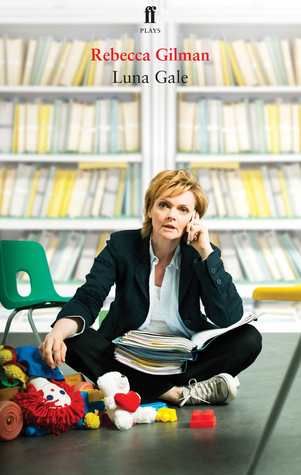 Luna Gale by Rebecca Gilman
Luna Gale by Rebecca GilmanMy rating: 4 of 5 stars
NOTE: The following is response feedback that I wrote for the class I read LUNA GALE for, so take this “review” with that in mind!
Also? ** SPOILER ALERT!!! **
I have to say that Luna Gale has really influenced me to focus on a project that has been nitpicking at me for a long time. Since 2012. It’s called “The Right Hand”, and it delves into the question of religion, faith, and God in a different way. It’s a genre piece, but also sort of a philosophical wandering”, I guess.
Not to make it sound more important than it is, but I think working on “The Right Hand” feels apt.
This is especially true because I really struggled with the morality compass in this story. Everyone felt pretty deplorable and untrustworthy; Caroline is certainly not innocent here, but I really felt as though she was completely outnumbered. Not only that, she was fighting some sort of secret cabal at the very same time that she was fighting all of the bureaucratic issues at work. Religion is not an issue, but when your co-workers and key members of a case are banding together based on faith, to the extent that they ignore clear-cut state policies, well… Houston, we have a problem.
Religion is not an issue, but when your co-workers and key members of a case are banding together based on faith, to the extent that they ignore clear-cut state policies, well… Houston, we have a problem. At the same time, Caroline was operating on a faith of her own, which was also super dangerous, especially considering the potential fate of Luna Gale. I mean, her parents almost killed her via neglect and stupidity, and Caroline believes that “they’re good people”? Well guess what? Babies aren’t little rewards that are given out to “good people”; and Caroline was treating Luna Gale as just that, prioritizing her “good feelings” about Karlie and Peter over what was really the best for Luna.
It just seemed as though, as was brilliantly said in class, that everyone was so high off their own faith-based beliefs that they ignored the facts. Thankfully, we have a somewhat happy ending, but we reached this point with very little faith it would turn out that way.
As for the actual “quality” of the play, Luna Gale knocks us down and out of the park. 
Book Review: “Luna Gale” by Rebecca Gilman
 Luna Gale by Rebecca Gilman
Luna Gale by Rebecca GilmanMy rating: 4 of 5 stars
NOTE: The following is response feedback that I wrote for the class I read LUNA GALE for, so take this “review” with that in mind!
Also? ** SPOILER ALERT!!! **
I have to say that Luna Gale has really influenced me to focus on a project that has been nitpicking at me for a long time. Since 2012. It’s called “The Right Hand”, and it delves into the question of religion, faith, and God in a different way. It’s a genre piece, but also sort of a philosophical wandering”, I guess.
Not to make it sound more important than it is, but I think working on “The Right Hand” feels apt.
This is especially true because I really struggled with the morality compass in this story. Everyone felt pretty deplorable and untrustworthy; Caroline is certainly not innocent here, but I really felt as though she was completely outnumbered. Not only that, she was fighting some sort of secret cabal at the very same time that she was fighting all of the bureaucratic issues at work. Religion is not an issue, but when your co-workers and key members of a case are banding together based on faith, to the extent that they ignore clear-cut state policies, well… Houston, we have a problem.
Religion is not an issue, but when your co-workers and key members of a case are banding together based on faith, to the extent that they ignore clear-cut state policies, well… Houston, we have a problem. At the same time, Caroline was operating on a faith of her own, which was also super dangerous, especially considering the potential fate of Luna Gale. I mean, her parents almost killed her via neglect and stupidity, and Caroline believes that “they’re good people”? Well guess what? Babies aren’t little rewards that are given out to “good people”; and Caroline was treating Luna Gale as just that, prioritizing her “good feelings” about Karlie and Peter over what was really the best for Luna.
It just seemed as though, as was brilliantly said in class, that everyone was so high off their own faith-based beliefs that they ignored the facts. Thankfully, we have a somewhat happy ending, but we reached this point with very little faith it would turn out that way.
As for the actual “quality” of the play, Luna Gale knocks us down and out of the park. 
January 23, 2017
Play Review: “Mangdragola” by Niccolò Machiavelli
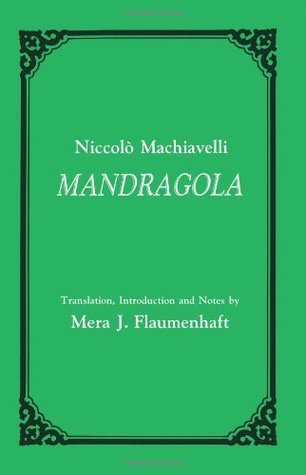 Mandragola by Niccolò Machiavelli
Mandragola by Niccolò MachiavelliMy rating: 4 of 5 stars
An interesting farce comedy that essentially reinforces what Machiavelli’s been saying all along: “The ends justify the means”. Being that I read this in class, I wrote a required Play Reader’s Journal for this piece, and so I’m just going to use that as my review.
** SPOILERS FROM THIS POINT ON!!! **
Play Reader’s Journal for Niccolò Machiavelli’s Mandragola
I. Vital Statistics
1. Title: Mandragola (The Mandrake)
2. Playwright: Niccolò Machiavelli
3. Date of Composition: 1504; also 1524-1526
4. Period: The Italian Renaissance
5. Company/House of Initial Performance: Performed during the Carnivale in Florence
6. Setting of Play: Florence
7. Genre of Play: Comedy
II. Characters and Action
Characters
1. Callimaco Guadagno: a dastardly fiend who is “in love” / in lust with Lucrezia, and who desires to sleep with her.
2. Siro: Callimaco’s servant
3. Messer Nicia Calfucci: an old, “simple-minded”, and rich judge, who is also Lucrezia’s husband. He wants a son and heir.
4. Ligurio: a marriage broker and hack, who now hustles food out of people for a living, He helps Callimaco to get into bed with Lucrezia
5. Sostrata: Lucrezia’s mother, who doesn’t see anything wrong with her daughter having a lover, and a baby, along with a rich husband. (Is she the early incarnation of feminism?)
6. Friar Timoteo: a corrupt friar and man of the cloth who Callimaco convinces (read: pays) to play an integral role in the deception of Lucrezia and Nicia
7. A Woman: a person who introduces Machiavelli’s idea of women and introduces the themes they represent (I think)
8. Lucrezia: a beautiful and very virtuous woman, whose reputation for both precedes her. She is controlling of her husband Nicia
Action
While living in Paris, Callimaco hears of the famed beauty and virtue of Lucrezia, the wife of a rich judge, Messer Nicia. He is so enamored with her that he returns to Florence to find, court, and sleep with Lucrezia. He cannot do so, however, because Lucrezia is married. Still, there is a loop hole for Callimaco: Lucrezia and Nicia have yet to have a child and heir, and Nicia wants a son more than anything.
So Callimaco, his servant (Sirio), a marriage broker (Ligurio), and a corrupt friar (Friar Timoteo) devise a plan to help Callimaco get into bed with Lucrezia. Callimaco will disguise himself as a doctor and prescribe Lucrezia the mandrake, a potion that will increase Lucrezia’s chances at having a child. The downside, though, is after Lucrezia takes the potion, the first man to sleep with her afterward will die. This isn’t true, of course; this is all a ruse that Callmaco throws onto Nicia so that Callimaco will be allowed to sleep with Lucrezia.
After a lot of scheming and plotting, Callimaco use Friar Timoteo to convince Lucrezia that having an affair on her husband is actually not morally corrupt, but is Lucrezia’s divine duty. Lucrezia, being the morally virtuous woman that she is, is very against this entire plan. In the end, however, her mother (Sostrata) and the Friar convince Lucrezia that this is her duty and she need not feel corrupt or ashamed. Reluctantly, Lucrezia agrees to the plan.
When Callimaco (disguised as the supposed sacrificial lamb who will sleep with Lucrezia and die from the mandrake) finally goes to Lucrezia and reveals his true identity, they sleep together. Lucrezia now knows that this entire mandrake deal is a farce and that she was set up and used by all the corrupt people in her life. She decides that she will then take her own piece of the pie, and so takes Callimaco as her lover. The plays ends with everyone essentially getting what they want while disregarding their piety altogether.
III. Themes and Resonance
Machiavelli certainly does not hold back in his critique of the church and of the Bible, both of which are deliberately misinterpreted in order to further the ends of evil. This particular quote from The Friar really stood out to me “As for whether the act is a sin, that’s easy: because it is the will that sins, not the body; and it’s a sin if it displeases the husband, whereas you are obliging him; or if you take pleasure in it, whereas you find no pleasure” (21). The Friar also tells Lucrezia that “her purpose is to fill a seat in paradise and make her husband happy” (21).
Here, Machiavelli shows us how easy it is for men to be swayed to the side of evil when what they desire is close at hand. Nicia wants a son, but is pushed into this crazy situation that he knows is wrong (morally and biblically), all because he wants an heir. The Friar is getting paid off with crazy coins to engage in this deception (the very act of which is a major insult to the Church and their system of exchanging morality for money). And of course, Callimaco, the scoundrel, is totally revamping the idea of “monogamous marriage” and introduces polyamory into a once pious household. This is an episode straight out of Days of Our Lives… the Italian Renaissance version.
The theme that stood out most to me is the one that was realized through Lucrezia: that, even though we may have an instinct of right and wrong, sometimes external power dynamics can exert such force on us that we are led astray from our own morals. I found it pretty amazing (and daunting) that though Lucrezia knew that laying down with another man was wrong, she gave into the religious preachings and proddings of the Friar to do “God’s work” and fall pregnant with another man. Machiavelli makes an interesting point about man abandoning his own inner compass for the sake of religion and allowing true evil to befall himself and his household as a result.
Another interesting take on this play is that one can say that Machiavelli has succeeded in demonstrating the viability of his own philosophy, “the ends justify the means”, above and beyond that of the Church. Can man truly be saved? Is the Church potent enough to really led men into the hands of God? Or is Machiavelli truly the only one who understands man’s true nature, and does man’s nature always win in the end, even against the omnipotence of God? All questions I considered when reading this piece.
In conclusion, though the points raised by the piece are interesting, Machiavelli’s overstated theme felt a little forced and unconvincing. This was mainly due to the style in which he told the story, mainly by using the Prologue and a lot of exposition. I think that if Machiavelli’s bitterness weren’t coming across so clearly, he could be more convincing on the page as to the Church’s corruption. While the Prologue was really entertaining and brazen, it pretty much killed any hope of subtlety and subtext. Therefore, the playwright’s intentions were made painfully clear. From a stylistic standpoint, I personally tend to be more convinced of a play’s message when I’m not being beaten over the head with it, where I can fall into the “showing” aspect of the piece more so than the “telling” aspect of the piece. On my part, I’m dying to know how the audiences reacted to this play in that time.
Rock on, READ on,
The post Play Review: “Mangdragola” by Niccolò Machiavelli appeared first on .



